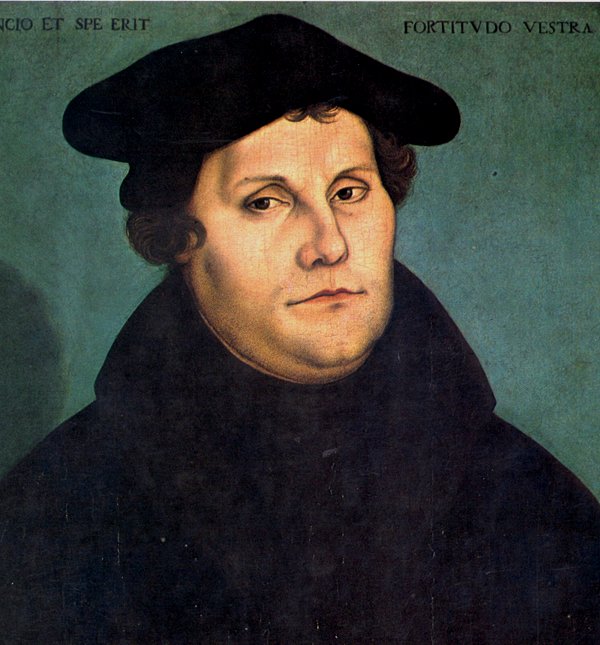
Martin Luther najznámejšie citáty

Martin Luther Citáty o bohu
„Tu stojím, ináč nemôžem, tak mi Pán Boh pomáhaj.
Worms“
Potvrdené výroky
Zdroj: Tranovský evanielický kalendár 2004, Martin: Tranoscius 2004, ISBN 80-7140-227-3, s. 71.
Martin Luther Citáty o ľuďoch
Martin Luther citáty a výroky
Martin Luther: Citáty v angličtine
“The true Gospel has it that we are justified by faith alone, without the deeds of the Law.”
Zdroj: Commentary on the Epistle to the Galatians (1535), Chapter 2
The Estate of Marriage, 1522, translated by Walther I. Brandt, from Luther's Works, Vol. 45, pp. 32-34); as quoted in Martin Luther: Execute Adulterers, Witches, Frigid Wives, & Prostitutes, Pagadian Diocese http://www.pagadiandiocese.org/2017/10/30/martin-luther-execute-adulterers-witches-frigid-wives-prostitutes/, October 26, 2017, Dave Armstrong
“I know God only as he became human, so shall I have him in no other way.”
Das Marburger religionsgesprach 1529: Versuch einer Rekonstruction (Leipzig, 1929), p. 27; also LW 38, 3-90
“We are beggars: this is true.”
Wir sind bettler. Hoc est verum.
"The Last Written Words of Luther," Table Talk No. 5468, (16 February 1546), in Dr. Martin Luthers Werke (1909) as translated by James A. Kellerman, Band 85 (TR 5) 317–318 http://www.iclnet.org/pub/resources/text/wittenberg/luther/beggars.txt
Table Talk (1569)
Against the Roman Papacy, An Institution of the Devil ( Wider das Papstum zu Rom vom Teuffel Gestifft, A. D. 1545) http://books.google.com/books?id=GLAMHQAACAAJ&dq=luther+1545+%22+das+papstum+%22&lr=
Zdroj: The Freedom of a Christian (1520), p. 70
Weimar edition of Martin Luther's Works, English translation edited by J. Pelikan [Concordia: St. Louis], Vol. 51, 128-129
Zdroj: The Freedom of a Christian (1520), pp. 71-72
“Let us keep to Christ, and cling to Him, and hang on Him, so that no power can remove us.”
Zdroj: Dictionary of Burning Words of Brilliant Writers (1895), p. 433
Thesis 17
Disputation against Scholastic Theology (1517)
“To turn one's eyes away from Jesus means to turn them to the Law.”
Zdroj: Commentary on the Epistle to the Galatians (1535), Chapter 2
To His Housewife (An Seine Hausfrau), end of July 1545, De Wette, vol. v (Fünfter Theil, 1828), p. 753. No. MMCCLXXXVI http://books.google.com/books?vid=0SgD2vFniuUDWUSHsu8FSM5&id=Ez96yjkxWYoC&pg=PA752&dq=Dr.+Martin+Luthers+Briefe,+Sendschreiben McGiffert, p. 374 (English tr.).
McGiffert, Arthur Cushman. Martin Luther: The Man and His Work http://books.google.com/books?vid=OCLC01594761&id=ySbbvfFlGLMC&pg=PP15&lpg=PA1&dq=%22Arthur+Cushman+McGiffert+%22 (Century, 1911), from Google Books. Reprint from Kessinger Publishing (July 2003), ISBN 076617431X
Whether Soldiers Can Also Be in a State of Grace (1526)
Zdroj: Against the Heavenly Prophets in the Matter of Images and Sacraments (1525), pp. 85-86
“There can be no doubt that the Virgin Mary is in heaven. How it happened we do not know.”
Weimar edition of Martin Luther's Works (Translation by William J. Cole) Vol. 10, p. 268
Zdroj: Against the Heavenly Prophets in the Matter of Images and Sacraments (1525), pp. 84-85
Zdroj: The Freedom of a Christian (1520), pp. 78-79
Luthers Works, 40 p. 146 as quoted in Against the Idols: The Reformation of Worship from Erasmus to Calvin https://books.google.com/books?id=95sDFZbl4S4C&pg=PA55&source=gbs_toc_r&cad=3#v=onepage&q=Calvin&f=falseby Carlos M. N. Eire, p. 72
Zdroj: Dictionary of Burning Words of Brilliant Writers (1895), p. 320
Tractatus de indulgentiis per Doctorem Martinum ordinis s. Augustini Wittenbergae editus., or, A Treatise on Indulgences Published by Doctor Martin of the Order of St. Augustine in Wittenberg. To Archbishop Albrecht of Mainz (31 October 1517) Luther's "forgotten" treatise was found in the Mainz archives “among the papers making up the correspondence between Archbishop Albrecht and the Mainz University faculty in December 1517” and published by F. Herrmann in the Zeitschrift für Kirchengeschichte (ZKG) in 1907, vol. 28, pp. 370-373. Catholic Luther scholar Jared Wicks S. J. believes this early treatise to be of considerable historical significance: "This document is the short treatise sketching a tentative theology of indulgences which Luther sent to Archbishop Albrecht of Mainz and Magdeburg on that fateful October 31, 1517. The other two documents of Luther's intervention are well known. First, there was the respectful, though urgent letter to the Archbishop in which Luther related the misunderstandings being spread by Tetzel's preaching and in which he begged the Archbishop to issue new instructions which would bring Tetzel under control. Secondly, there was the list of Latin theses on the doctrine and practice of indulgences which Luther intended to use as the basis of a theological discussion of the many vexed questions in this area. The third document sent to Albrecht, Luther's treatise, has not received the attention it deserves from historians and theologians studying the beginning of the Reformation. This is most regrettable, since the treatise depicts in orderly and succinct fashion Luther's understanding of indulgences in 1517 and reveals his conception of their limited role in Christian living. The treatise gives us the theological standpoint on which Luther based his intervention, and it shows in miniature the rich Augustinian spirituality of penance and progress that he had forged in his early works. ...[T]he great tragedy of 1517 was that the barbed [95] theses spread over Germany in a matter of weeks, and this penetrating little treatise fell into dusty oblivion."
Martin Luther's Treatise on Indulgences, Theological Studies 28 (1967), pp. 481-482, 518. http://www.google.com/search?tbm=bks&hl=en&q=%22forgotten+document+in+luther%27s%22&btnG=#hl=en&q=%22forgotten%20document%20in%20luther%27s%22&um=1&bpcl=35466521&psj=1&ie=UTF-8&sa=N&tab=pw&psj=1&ei=Y-6JUJ-mL4eo8gShuYDIBQ&bav=on.2,or.r_gc.r_pw.r_qf.&fp=e5b835ba41618e18&biw=1232&bih=702 http://www.google.com/search?tbm=bks&hl=en&q=%22forgotten+document+in+luther%27s%22&btnG=#hl=en&q=%22forgotten+document+in+luther%27s%22&um=1&bpcl=35466521&psj=1&ie=UTF-8&tbo=u&tbm=bks&source=og&sa=N&tab=wp&psj=1&bav=on.2,or.r_gc.r_pw.r_qf.&fp=4fa257fccf8e3a83&biw=1232&bih=702
“I’d rather be ruled by a competent Turk than an incompetent Christian.”
The earliest published source for such a statement yet located is in Pat Robertson — Where He Stands (1988) by Hubert Morken, p. 42, where such a comment is attributed to Luther without citation.
Disputed
Zdroj: Commentary on the Epistle to the Galatians (1535), Chapter 2, Verse 14
As attributed by Kai Lehmann, curator of the exhibition "Luther und die Hexen" ("Luther and the witches"). (2013) in “Interview with Dr. Kai Lehmann, curator of the exhibition "Luther und die Hexen" ("Luther and the witches")“ https://www.luther2017.de/en/wiki/martin-luther-and-the-witches/kai-lehmann-martin-luther-firmly-believed-in-witches/
Disputed
“The human being, corrupted to the root, can neither desire nor perform anything but evil.”
The Making of Martin Luther, By Richard Rex, p66
Attributed
Marthin Luther, Comment, ad Galat., 310. As cited by Rev. Msgr. Patrick F. O'Hare (1916), The Facts about Luther https://archive.org/details/factsaboutluther00ohar_0/page/118/mode/2up?q=%22cloak+of%22, p. 119. OCLC 4200594.
